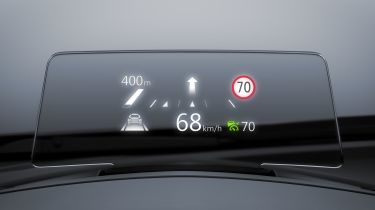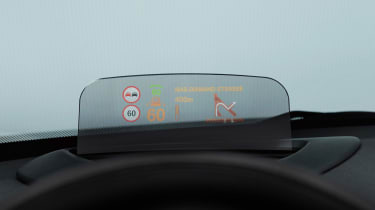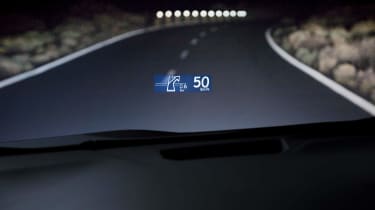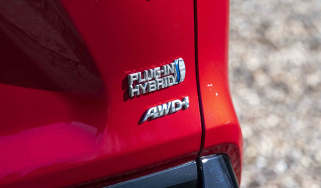What is a head-up display, or HUD?
The modern driver is discovering something fighter pilots have long known to be true: head-up displays are a great piece of technology

Cars have become loaded with more technology and screens to operate them, however this can be distracting and force drivers to take their eyes off the road. Car makers are taking inspiration from aviation to overcome this challenge by giving drivers the information they need, in a place that doesn’t distract them from the road ahead using head-up displays.
A large number of cars can be specified with a head-up display (or HUD), from the luxurious Lexus RX to the humble Mazda CX-3. Unless you’ve recently left the air force, you might not be familiar with what a HUD is and how it works. It’s also worth knowing that not all HUDs are created equal: there are two main types, and one is generally considered superior to the other. This guide gives you the heads up on HUDs.
Where to legally mount your sat nav
What is a head-up display?
A head-up display is a projector that beams essential driver information into your field of view, so that it appears superimposed on the road ahead in mid-air. Although having a light beamed onto the windscreen may sound distracting, the information and its positioning have been carefully designed to be harmonious with your view ahead rather than cause any issues.
Head-up displays were originally developed for military use during the Second World War. The system was viewed with scepticism at first, but it soon caught on. Air chiefs noticed that pilots using a HUD to control their weapons had more attention to spare on actually flying their planes – essentially because they were able to keep their ‘heads up’, rather than having to glance down frequently at ancillary gauges and dials.
Although the majority of car journeys are less demanding than most military exercises, a HUD can still be a useful box to tick on the options list. Carmakers looked into applying HUDs to cars back in the 1970s but recent technological advancements – together with the increasing affordability of complex electronics – mean more and more cars are now coming equipped with a HUD.
Why are HUDs fitted to cars?
Technology now allows for more information than ever before to be viewed by a driver, however there are certain core values that anyone behind the wheel needs to know. A HUD helps to declutter the mass of information, presenting only the most crucial data like your speed and which way to turn next in an easy to view position.
Having this information displayed directly ahead of a driver at all times means there’s less reason to take your eyes from the road, and reduces the chances of distractions that complex menus and screens can cause.
At higher speeds, taking your eyes off the road results in large distances covered without your full attention. It also demands that you refocus when returning your eyes to the road, increasing the chance of collisions and traffic accidents.
What are the two different types of head-up display?

The easiest way for manufacturers to equip a car with a HUD is to use a ‘combiner’ system. This comprises a discretely hidden projector that beams its information onto a small transparent screen, or combiner. The combiner screen typically rises from the dashboard, and some can be lowered when the system is not in use. Many combiner screen HUDs are made by secondary manufacturers like Bosch. These can then be fitted by the carmaker at their factory, saving them the expense of having to engineer their own HUD system. The Mazda2, Peugeot 3008 and the new Renault Megane are some of the cars that allow you to specify a combiner screen HUD.
Combiner screens have softly-milled edges and an aspheric surface, meaning they’re almost invisible when viewed from dead ahead. If you’ve got a combiner HUD and find it distracting, check your car’s handbook to see if you can change the screen’s angle or the brightness of the graphics, as adjusting these settings should remedy matters.

The second type of HUD still uses a projector but dispenses with the combiner screen, instead beaming its information directly onto the windscreen. This means there’s no (potentially distracting) combiner screen to worry about, and the carefully designed lines of the dashboard aren’t interrupted, either. In order for this type of HUD to work, the windscreen has to be specially treated to allow it to reflect the beamed information. Windscreen-projector HUDs are generally more expensive to make than combiner screen systems, so tend to be found in upmarket cars like the Jaguar XE, the BMW 6 Series and the Bentley Bentayga – and even with these cars, they're often an optional extra or reserved for high-spec models.
What information can you expect a HUD to show?
All head-up displays will show the car’s speed as a bare minimum. If the car has sat-nav, most will beam turn-by-turn directions onto the HUD – though don’t expect the graphics to be as detailed or plush as they are on the sat-nav screen – there’s a limit to how sophisticated the images shown by a HUD projector can be. HUDs can also display what gear you’re in, your fuel level and consumption, any engine warning lights that may come on, cruise control information and the road’s speed limit – assuming your sat-nav supports this feature, or your car has a traffic sign recognition system.
To learn more about safety systems like head-up displays, check out our comprehensive guide to the technology protecting you on the road today.
Car technology, made simple
Recommended

Petrol and diesel car ban relaxed with hybrids permitted beyond 2030

Classic car tax exemption: which historic vehicles qualify?

Car warranties: guide to new and used car warranties
Most Popular
Tips & advice

Car dashboard warning lights: what does each symbol mean?

Electric car charging stations: public networks, charger types, apps and maps







